Our editors independently select these products. Making a purchase through our links may earn Well+Good a commission
9 Best Probiotic-Rich Yogurts That Support Your Microbiome With Every Bite, According to an RD
The best probiotic yogurt is rich in live active cultures, high in protein, and low in added sugar. Check out the best options on the market.

Back in the day, strawberry-flavored Go-Gurts were *the* must-have lunchbox staple that made eating yogurt at school totally cool. But, as we grow older and our palates become much more refined, eating yogurt out of a tube with a cartoon character plastered in the front might not be the move. (Although, of course, there’s nothing wrong with feeding our inner child with a nostalgia-inducing throwback snack.)
Experts in This Article
registered dietitian and prenatal and postnatal health expert
That being said, seeing as the dairy aisle feels more crowded than ever before (Greek yogurt! Sugar-free yogurt! Low fat, non fat, full fat! Skyr! Plant-based! Yogurt covered in M&Ms!), the real question many of us face today is more along the lines of: How can we even begin to pick the best yogurt for gut health from a seemingly endless array of options? According to Lauren Manaker, RDN, LD, CLEC, CPT, a registered dietitian based in Charleston, one thing they have in common: probiotics. Ahead, we’re unpacking healthy benefits of the best probiotic yogurt on the market.
The best probiotic yogurt, at a glance:
- Best skyr-style yogurts:
- Best Greek yogurts:
- Best plant-based probiotic yogurts:
- Best drinkable yogurts:
- Best regular yogurt:
What are probiotics?
Probiotics are live microorganisms you can consume—like bacteria and yeast—to gain health benefits for your body. Probiotics can help support digestive health by bolstering your gut flora1 so that you can digest food properly. Probiotics might also support the health and functioning of your immune system2.
Many foods naturally contain probiotics, such as kimchi, sauerkraut, and miso, but the amount of probiotics vary depending on how the food is treated or prepared. “Dairy products like kefir and yogurt are among the best vehicles for delivering beneficial bacteria to our gastrointestinal tract,” Ali Webster, PhD, previously told Well+Good.
Do probiotic yogurts really work?
Yogurt is a fermented dairy product with tons of health and gut-boosting potential thanks to its high probiotic content. “There is ample data linking consuming dairy yogurt and gut health, so I tend to look to it as a delicious way to help boost and balance my microbiome,” Manaker says. As such, probiotic yogurt is an excellent way to keep your gut in check.
That said, it’s important to not overdo it with probiotics, either. In fact, adding a probiotic supplement to your daily routine—especially if things are already flowing smoothly—isn’t always a good idea. “If you’re dealing with specific GI concerns, incorporating a probiotic supplement might make sense for you. But if you’re taking a probiotic because you heard it was a good thing to do, well, you could likely skip it,” Anthea Levi, RD, previously shared with Well+Good.
In short, getting probiotics through your diet by way of yogurt and other fermented foods in moderation is key. Otherwise, you may run the risk of disrupting the delicate balance in your microbiome.
Which yogurt is highest in probiotics?
Among the different types of probiotic yogurt, kefir tends to take the prize for having the most (and most diverse) probiotics. Research shows that kefir milk can contain up to 61 strains of bacteria4 that support gut health. Meanwhile, other conventional types of probiotic yogurts typically come with just two main types of bacteria, Lactobacillus bulgaricus and Streptococcus thermophilus.
Additionally, a small study published in the journal NPJ Science of Food5 found that daily consumption of kefir resulted in noticeable positive changes to people’s gut microbiomes compared to an equivalent serving of fermented milk with probiotics. (Translation: Kefir has the most power to change your gut for the better.)
What to look for in a probiotic yogurt
1. Stick to yogurts with low sugar
According to Manaker, the lower the sugar, the better. “When I am selecting my yogurt, I try to opt for those that contain as little added sugar as possible. Since fruit is a natural source of sweetness that contains no added sugar, combining a low-sugar or sugar-free yogurt with some berries, kiwis, bananas, or otherwise gives my dish a boost of flavor along with antioxidants, fiber, and nutrients,” Manaker says.
2. Check the label for live cultures
If you want probiotic benefits from your yogurt, look for live cultures on the label, suggests Manaker. (Live cultures = probiotics.) While all fermented products like yogurt are made using live cultures, not all of them have live cultures remaining in the final product. “I always make sure the container indicates that it contains live and active cultures to ensure I am fueling my gut with live probiotics,” she says. And FYI: The exact colony forming unit (CFU) count doesn’t necessarily matter.
3. Avoid products with unnecessary additives
Another no-no in Manaker’s yogurt-shopping book is unnecessary additives. “I always choose yogurts that are free from artificial colors and flavors,” she says. Make sure to read the ingredient labels before you check out.
4. Choose yogurt with some healthy fat
“I like leaning on Greek yogurts, as they tend to contain more protein and fewer grams of added sugar. Having a little fat helps make the yogurt a bit more satisfying, and it helps curb feeling hunger pangs shortly after eating my yogurt,” Manaker says. “Some data suggests that dairy fat may play a positive role in reducing blood pressure63 in certain situations, too.”
The best probiotic yogurt you can buy:
The best skyr-style yogurts
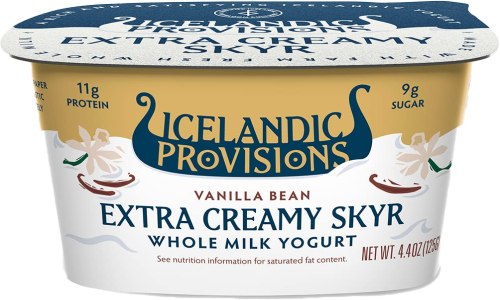
1. Icelandic Provisions Extra Creamy Skyr — $2.00
Skyr is a super thick, creamy yogurt that people in Iceland have been making for over 1,000 years. One serving of this yogurt contains 11 grams of protein and three unique strains of probiotics. We also like how simple the ingredients list is (no sketchy fillers here!). Just note that this product does contain added cane sugar—great if you don’t like the taste of monk fruit or other sugar alternatives, but something to keep in mind if you are watching your added sugar intake.
Volume: 4.4 ouncesServing size: 1 containerProtein: 11 gramsSugar: 9 grams (6 grams added)
Pros:
- Multiple probiotic strains
- Rich, creamy consistency
- Flavor versatility
Cons:
- Higher sugar content
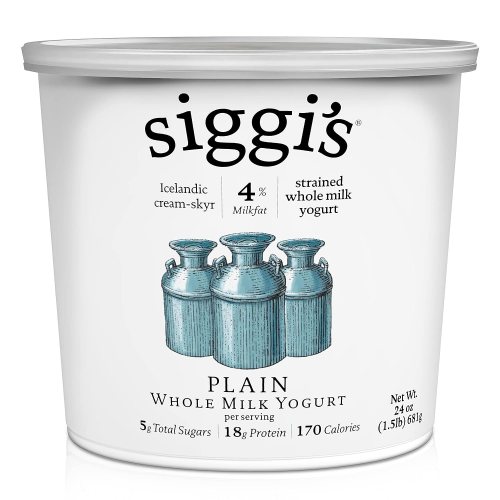
2. Siggi’s Icelandic Strained Skyr Whole Milk Yogurt Tub — $6.00
One serving of this skyr-style yogurt contains five grams of natural (not added) sugar and a whopping 18 grams of protein, making it the perfect base a filling, satisfying breakfast or snack. We like that you can find this yogurt in whole milk, low-, and non-fat varieties. If plain yogurt isn’t your jam, check out the strawberry & rhubarb or mixed berries flavors—just remember that they’ll be a little higher in sugar.
Volume: 24 ouncesServing size: 2/3 cupProtein: 18 gramsSugar: 5 grams (0 grams added)
Pros:
- No added sugar
- Simple ingredients list
Cons:
- Limited flavor selection
Best Greek yogurts
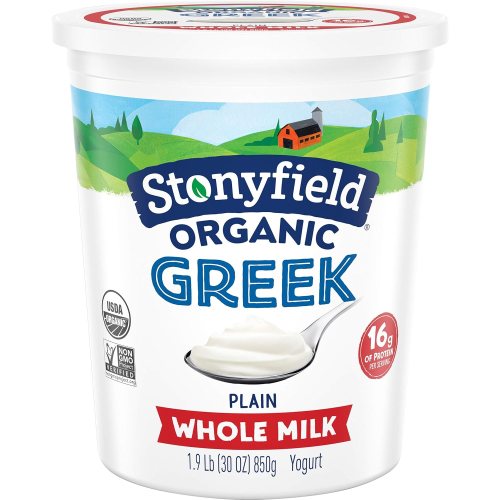
3. Stonyfield Organic Greek Whole Milk Yogurt — $9.00
When you’re looking to reap yogurt benefits for gut health, Manaker says there’s one option she always recommends: Greek yogurt. “When I am making a grocery run, I always grab a container of Stonyfield Organic plain Greek yogurt—not only because it offers a variety of live cultures, but it contains no added sugars and is made with quality organic ingredients,” she says. She also loves the impressive protein count.
Volume: 30 ouncesServing size: 3/4 cupProtein: 16 gramsSugar: 5 grams (0 grams added)
Pros:
- USDA Organic
- No added sugar
- Contains six different live cultures
Cons:
- Very limited flavor range
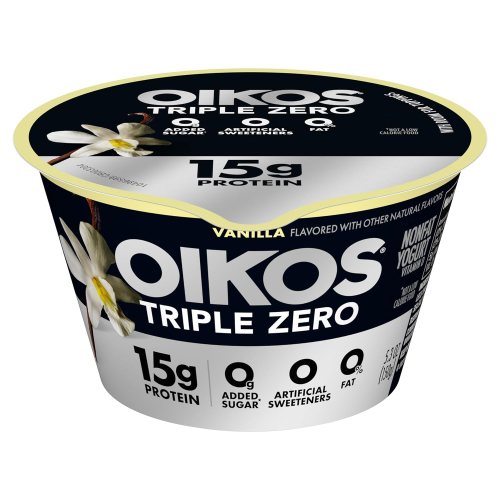
4. Oikos Triple Zero Vanilla Nonfat Greek Yogurt — $2.00
A single serving of this plain yogurt clocks in at an impressive 15 grams of protein—that’s nearly as much as three entire eggs. Sprinkle on some nuts and seeds to add some healthy fats. This yogurt also doesn’t have any added sugar, getting its sweetness from stevia instead. (Good to know if you’re not a fan of stevia’s aftertaste.)
Volume: 5.3 ouncesServing size: 1 cupProtein: 15 gramsSugar: 5 grams (0 grams added sugar)
Pros:
- No added sugar
Cons:
- Stevia leaf aftertaste
Best plant-based probiotic yogurts
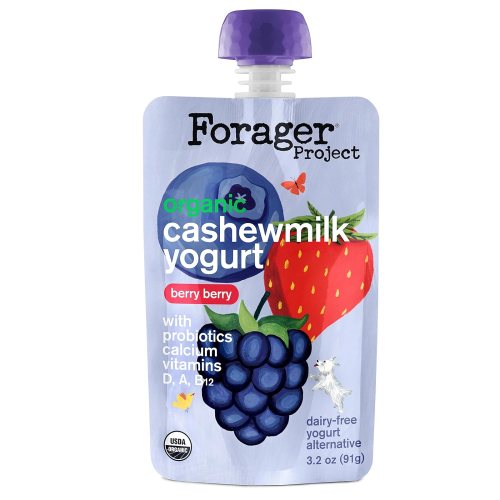
5. Forager Project Organic Berry Berry Cashewmilk Kids Yogurt — $2.00
Manaker says that she loves The Forager Project’s cashew milk yogurt pouches. (Do I spy the modern-day Go-Gurt?) “Even though it is marketed for kids, I love the product because it is so easy to eat when on the go,” she says.
“The yogurt has added probiotics and nutrients that some dairy-free yogurts can be missing, like vitamin B12. It has just enough added sugar to make it taste good without overloading our bodies with the sweet stuff, and it actually has some fiber and protein in it, too,” Manaker says. Another big plus is that it has no artificial colors or ingredients. Instead, it uses turmeric powder (an anti-inflammatory superhero) as a natural source of color.
Unfortunately, this option is much lower in protein than other products on this list, so be sure to pair it with other foods to ensure it’s a filling, satisfying snack.
Volume: 3.2 ouncesServing size: 1 pouchProtein: 2 gramsSugar: 7 grams (5 grams added)
Pros:
- Organic
- Dairy-free
- Convenient packaging
Cons:
- Low in protein
- Has added sugar
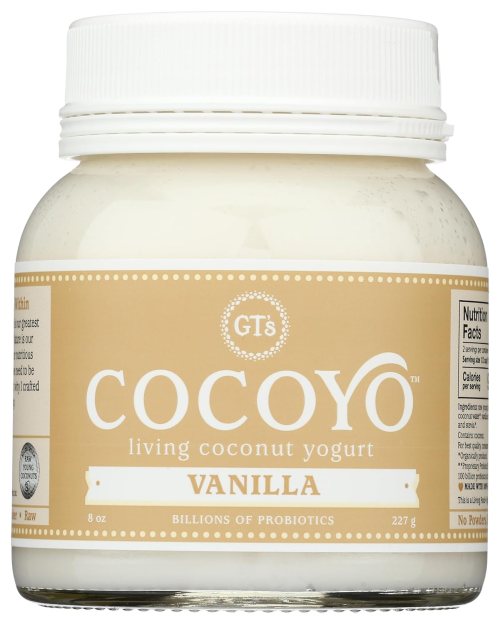
6. GT's Cocoyo Living Coconut Vanilla Yogurt — $7.00
This plant-based yogurt features a simple list of ingredients: raw young coconut, raw young coconut water, probiotic cultures, organic vanilla extract, and organic stevia. It’s mild-tasting and pairs well with your favorite assortment of fresh fruit. Unlike other types of yogurt, it also has a decent amount of fiber—four grams per serving!—and is very low in sugar.
Volume: 8 ouncesServing size: 1/2 cupProtein: 3 gramsSugar: 2 grams (0 grams added sugar)
Pros:
- Plant-based
- Creamy consistency
- Good source of fiber
Cons:
- Expensive
- Limited flavor selection
- Low in protein
Best drinkable probiotic yogurts
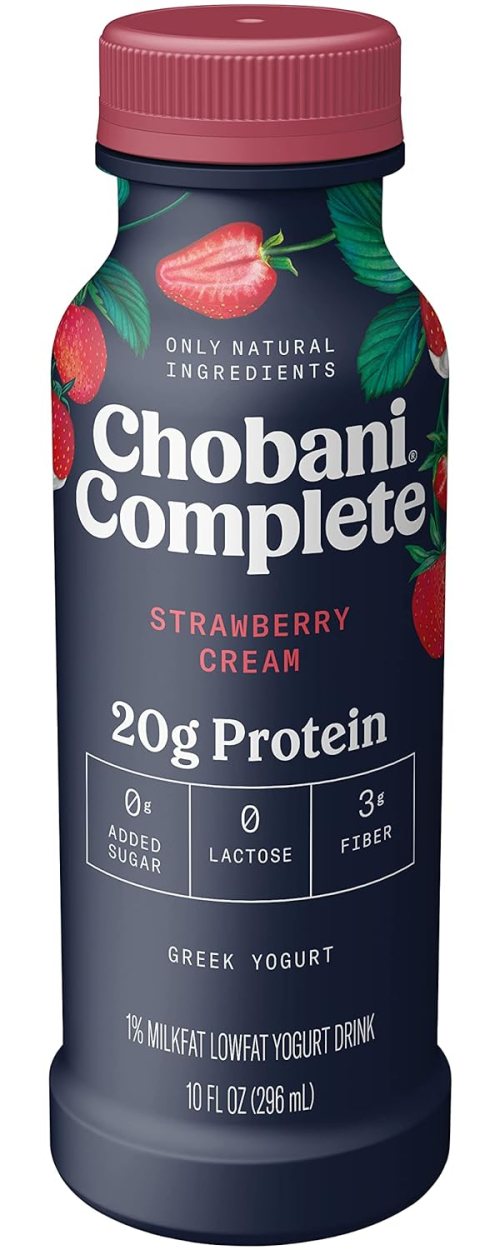
7. Chobani Complete Advanced Nutrition Protein Greek Yogurt Drink — $3.00
Refreshing and high-protein, this Greek yogurt-based drink contains a whopping 20 grams of protein and three grams of fiber per serving. It’s perfect way to get your daily dose of probiotics while on the go. It also has no added sugar thanks to the use of monk and stevia fruit extracts (although again, that taste might be off-putting to some). This product also doesn’t have lactose in it, making it safe for people who are lactose intolerant to enjoy.
Volume: 10 ouncesServing size: 1 bottleProtein: 20 gramsSugar: 12 grams (0 grams added sugar)
Pros:
- Very high in protein
- Convenient packaging
- Contains fiber
Cons:
- High natural sugar content
- Might have aftertaste from alternative sweetners
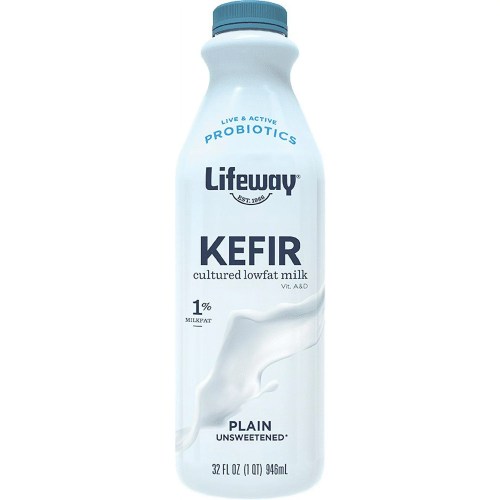
8. Lifeway Lowfat Plain Kefir — $4.00
Kefir is well-known for its versatility and probiotic diversity. This accessible, affordable option can be found in many grocery stores and is a delicious way to get more good gut bacteria in your life. Try subbing it for yogurt or milk in smoothies. We like that it’s fortified with vitamin D and has zero added sugars. The only downside: It’s lower in protein than most other dairy yogurts on this list.
Volume: 32 ouncesServing size: 1 cupProtein: 10 gramsSugar: 9 grams (0 grams added sugar)
Pros:
- Contains many different probiotics
- Affordable
- No added sugar
Cons:
- Lower in protein than other dairy yogurts
Best regular probiotic yogurt

9. Noosa Honey Yoghurt — $3.00
This probiotic-rich yogurt comes in small, resealable containers perfect for when you don’t have enough time to eat the whole tub in one sitting. Made with whole milk, each serving contains a decent amount of protein. However, this product does have the highest sugar count on this list—delicious, yes, but maybe best suited for an occasional snack rather than an everyday staple.
Volume: 8 ouncesServing size: 1 containerProtein: 13 gramsSugar: 28 grams (14 grams added sugar)
Pros:
- High in protein
- Lots of flavor variety if you don’t want honey
Cons:
- High sugar content
Does plant-based yogurt still have probiotics?
Manaker says that plant-based yogurts can still fuel the body with live cultures, so long as they are included in the processing. (So basically, look for that “live cultures” stamp on the label to be sure.) “Although dairy and plant-based yogurts are quite different, that’s not to say one is better than the other. Choose based on your own dietary needs,” she says.
That said, plant-based yogurt can come with some downsides—namely that it’s often very low in protein compared to dairy yogurt, Manaker says. But for some folks, eating dairy foods can result in constipation or gas, and if this is the case, a plant-based yogurt is the obvious best choice for you.
“Regardless of whether a person is choosing a dairy or plant-based yogurt, the variety should be low in added sugars, free from artificial ingredients, and, most importantly, should taste good,” Manaker says. Basically, you really can’t go wrong when it comes to choosing the right type. (Phew.)
How to boost the gut-health benefits from yogurt
To maximize the gut health benefits of probiotic yogurt, pair it with fiber. “Prebiotic fiber is an indigestible fiber that acts as fuel to beneficial bacteria,” Manaker says. “So, a slightly underripe banana, oats, and apples are all prebiotic food sources that can be combined with some of the best probiotic yogurt options for a one-two punch in the gut health department.” The more you know!
Preparation is also key for retaining the most probiotic benefits from your yogurt. “Remember that many strains of probiotic bacteria can not survive beyond 100 degrees Fahrenheit,” Manaker says. Using yogurt or kefir in baked goods, for example, is very delicious and can be a good way to add protein—but don’t expect to get any probiotic perks from the finished product.
Is it better to take a probiotic or eat yogurt?
Typically, most health experts recommend getting your nutrients from food sources first, then supplementing where needed depending on your health needs, dietary restraints, and so on. Currently, there’s no recommended daily intake of probiotics. So instead of stressing about how much to eat, it’s generally a good idea to have some probiotic foods to your daily diet, and take a supplement if your health-care provider recommends it. Whichever method of including gut-friendly probiotics in your daily routine is best for you is the way to go, so long as you remain consistent with your practice. Be it drinking probiotic drinks, taking a supplement, or eating probiotic yogurt daily. Now, where’s my trusty spoon?
Let’s talk even more about yogurt, shall we?
Amara, A A, and A Shibl. “Role of Probiotics in health improvement, infection control and disease treatment and management.” Saudi pharmaceutical journal : SPJ : the official publication of the Saudi Pharmaceutical Society vol. 23,2 (2015): 107-14. doi:10.1016/j.jsps.2013.07.001
↩︎Mazziotta, Chiara et al. “Probiotics Mechanism of Action on Immune Cells and Beneficial Effects on Human Health.” Cells vol. 12,1 184. 2 Jan. 2023, doi:10.3390/cells12010184
↩︎Aslam, Hajara et al. “The effects of dairy and dairy derivatives on the gut microbiota: a systematic literature review.” Gut microbes vol. 12,1 (2020): 1799533. doi:10.1080/19490976.2020.1799533
↩︎Bourrie, Benjamin C T et al. “The Microbiota and Health Promoting Characteristics of the Fermented Beverage Kefir.” Frontiers in microbiology vol. 7 647. 4 May. 2016, doi:10.3389/fmicb.2016.00647
↩︎Walsh, Liam H et al. “Comparison of the relative impacts of acute consumption of an inulin-enriched diet, milk kefir or a commercial probiotic product on the human gut microbiome and metabolome.” NPJ science of food vol. 7,1 41. 16 Aug. 2023, doi:10.1038/s41538-023-00216-z
↩︎Aljuraiban, Ghadeer S et al. “Relations between dairy product intake and blood pressure: the INTERnational study on MAcro/micronutrients and blood Pressure.” Journal of hypertension vol. 36,10 (2018): 2049-2058. doi:10.1097/HJH.0000000000001779
↩︎
Sign up for the Well+Good SHOP Newsletter
Get exclusive deals on wellness, beauty, fitness, and food products that have been hand-picked by our editors.
Got it, you've been added to our email list.









